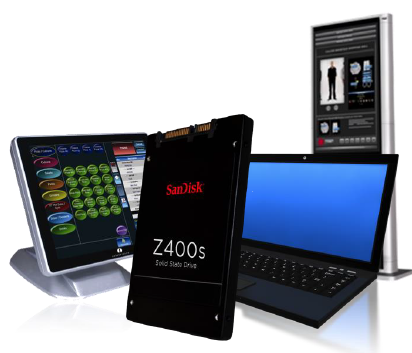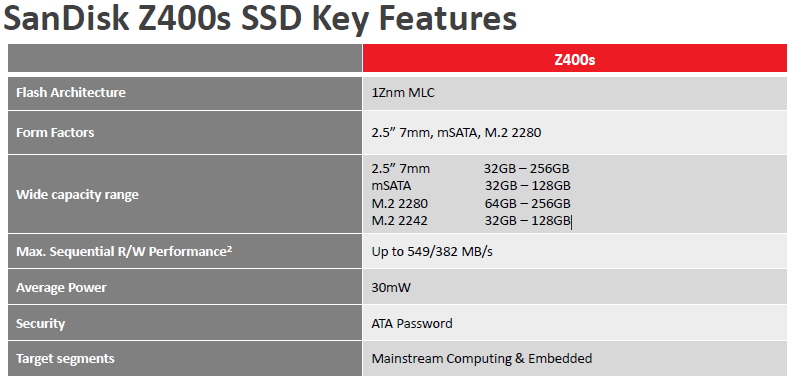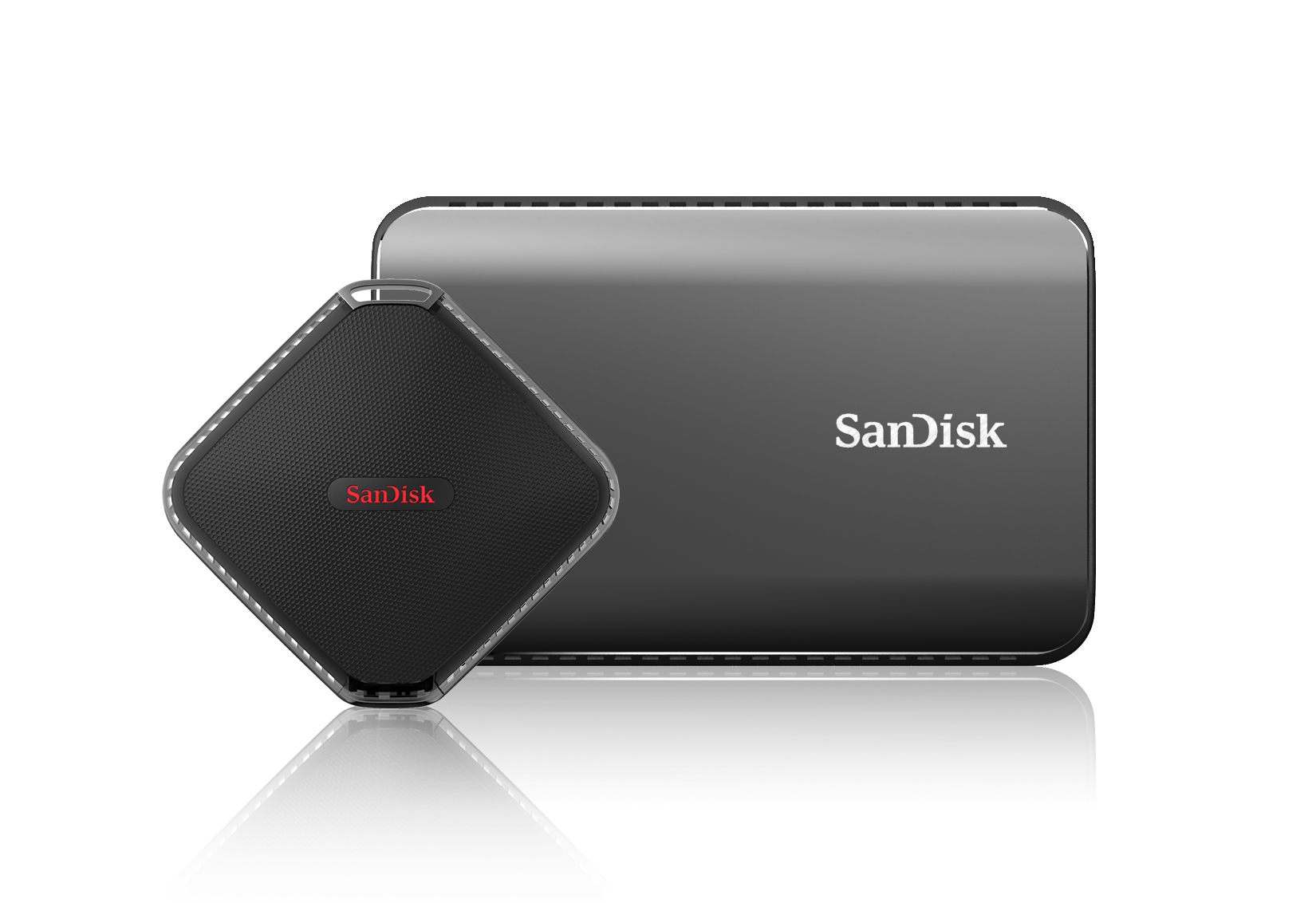The State Of Solid State: Computex 2015
SanDisk
SanDisk released the Extreme Pro at Computex 2014, and it is still the fastest client SATA SSD on the market today. Many expected SanDisk to use Computex as the platform to launch a PCIe-based client SSD, but that didn't happen. Instead, SanDisk updated its business line-up with the Z400s.
With both large and small capacity sizes, the Z400s can serve the embedded market and business notebook sector. The DRAM-less design should cost less than existing products in SanDisk's portfolio, but at the same time deliver enough performance to satisfy both roles.
SanDisk also released two external storage products at Computex 2015 with USB Type-C connectors. The Extreme 900 Portable SSD and Extreme 500 Portable SSD are aimed at creative professionals and tech enthusiasts. The latter scales to 500GB, while the former is available in capacities all the way up to 1.92TB, making the Extreme 900 Portable the largest all-flash portable drive on the market. The Extreme 900 Portable SSD also delivers up to 850 MB/s of sequential performance, a number that also makes it the fastest portable SSD on the market as well.
Get Tom's Hardware's best news and in-depth reviews, straight to your inbox.

Chris Ramseyer was a senior contributing editor for Tom's Hardware. He tested and reviewed consumer storage.
-
blackmagnum The time is ripe to change your old spinning catastrophe and embrace the now of SSD.Reply -
Vivecss So have they fixed the data loss if not connected to electricity for more than a week thing?Reply -
synphul Spinning catastrophe? My hdd doesn't perform much slower than my ssd for 90% of tasks, the biggest improvement was installing windows. For that I was impressed. An hdd shouldn't be a catastrophe, if it is I'd strongly suggest a better brand/model. Installed an ssd on a workstation and of all the upgrades it was the component I was least happy with. The new cpu and ram upgrade were by far more impressive. Not that I'm 'unhappy' with it, it is a little snappier though not enough to make me rush right out to buy another one for my other rig. If another 240gb ssd goes on sale for $60 like the first one I bought I might consider it. Pcie m.2 look appealing and great on paper but I suppose it would be of greater benefit to someone who is suffering a bottlenecked system due to storage in the first place.Reply -
CaedenV ReplySo have they fixed the data loss if not connected to electricity for more than a week thing?
Yes, about 5 years ago.
SSDs are still no archival media, and they will corrupt after a year or two without power. But if you are the sort of person who travels a lot and unplugs your PC for 2-3 months at a time then it is not a real concern anymore. -
wtfxxxgp ReplySo have they fixed the data loss if not connected to electricity for more than a week thing?
I'm so out of touch that I didn't even know that was "a thing"
O.o -
Vivecss ReplySo have they fixed the data loss if not connected to electricity for more than a week thing?
Yes, about 5 years ago.
SSDs are still no archival media, and they will corrupt after a year or two without power. But if you are the sort of person who travels a lot and unplugs your PC for 2-3 months at a time then it is not a real concern anymore.
Really? 5 years ago? Because I've gone on vacation for about a month and my Windows wont even start anymore. And that was about a year ago. Heard a rumor that the 3D stacking technology thing managed to eliminate this problem and i was waiting for some more good news about that before buying a new SSD.
-
CRamseyer ReplySpinning catastrophe? My hdd doesn't perform much slower than my ssd for 90% of tasks, the biggest improvement was installing windows. For that I was impressed. An hdd shouldn't be a catastrophe, if it is I'd strongly suggest a better brand/model. Installed an ssd on a workstation and of all the upgrades it was the component I was least happy with. The new cpu and ram upgrade were by far more impressive. Not that I'm 'unhappy' with it, it is a little snappier though not enough to make me rush right out to buy another one for my other rig. If another 240gb ssd goes on sale for $60 like the first one I bought I might consider it. Pcie m.2 look appealing and great on paper but I suppose it would be of greater benefit to someone who is suffering a bottlenecked system due to storage in the first place.
A $60 240GB SSD is the reason why you don't feel a big performance increase over your HDD.
-
WyomingKnott "Really? 5 years ago? Because I've gone on vacation for about a month and my Windows wont even start anymore. And that was about a year ago."Reply
But how old was the SSD? The model, not the particular one that you own. -
synphul It was on sale. At the time, ocz vector 150's were going for $180. It stays neck and neck with the samsung 840 evo (850's weren't even available yet) and the two trade blows a bit. The vector 150 has slightly slower random reads and the samsung has slightly slower write speeds. It was chosen for a workstation doing content creation with larger files where write speed was preferred. Maybe people feel such a huge difference over their hdd's because they're using junk hdd's? My wd re4 gives me no issues. The only time aside from bootup that ssd's seem to have a huge performance gain is during testing where a longer sustained data transfer is occurring. Something most people won't encounter under normal use of a pc, instead it will more than likely operate in small bursts. So technically, it was a $180 ssd using the newer 19nm toshiba nand. Hardly a junk ssd.Reply -
CRamseyer When you said it I was thinking something along the lines of a V300 with async flash.Reply


